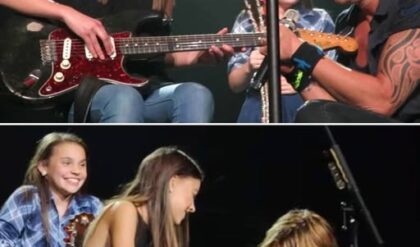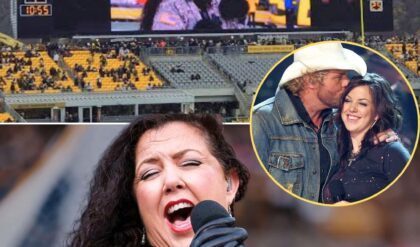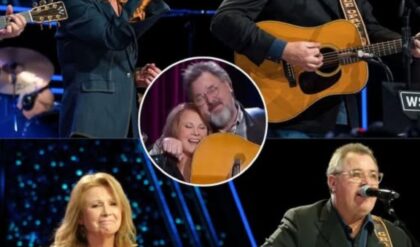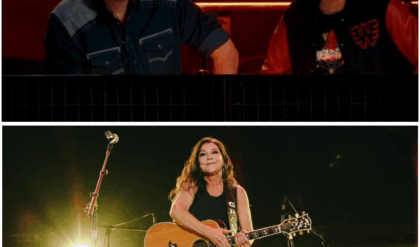In the throbbing pulse of Nashville’s Bridgestone Arena, where the ghosts of country legends like Hank Williams and Loretta Lynn still linger in the rafters like the smoke from a thousand backstage bonfires, the 59th Annual CMA Awards roared to life on November 19, 2025, with all the subtlety of a shotgun blast at dawn. Lainey Wilson, the 33-year-old Louisiana dynamo in her signature bell-bottoms and rhinestone resolve, stepped up as solo host for the first time—a historic nod to the genre’s evolving queens, following in the bootsteps of Dolly Parton and Reba McEntire. But before Wilson could crack her first wry one-liner about “keepin’ it country without keepin’ it quiet,” the lights plunged into shadow, the arena’s 20,000 souls holding a collective breath thick with anticipation and the faint tang of spilled bourbon. Then, like a thunderclap from the Cumberland River’s bend, flames erupted from the stage’s edges—pyrotechnics blooming orange and gold, licking the air with a heat that singed the front-row faithful. Out of the inferno rode Luke Combs: 35 years old, built like a brick outhouse from Carolina clay, his black cowboy hat tipped low over eyes that burned with the fire of a man who’d clawed his way from barroom obscurity to country’s unbreakable throne. Strapped with a six-shooter prop at his hip and boots caked in imaginary dust, he launched into “Back in the Saddle”—the blistering lead single from his as-yet-unnamed sixth studio album—with a strum that cracked like a whip. Flames roared higher, fireworks crackled overhead, and the Bridgestone crowd went feral: hats hurled skyward, beers hoisted like battle flags, a sea of flannel and fringe surging to their feet in a rebellion against the ordinary. Combs didn’t just kick off the show; he hijacked it, his raw country-rock grit turning every note into a shared uprising—a full-throttle reminder that in a genre teetering between TikTok twang and timeless truths, he’s the king who brings it all roaring back to life.
The CMA Awards, that glittering gauntlet where Music Row’s machinations meet the heartland’s howl, has long been country’s Super Bowl scripted in Stetsons and spotlights—a three-hour fever dream broadcast live on ABC to 12.8 million viewers, where wins are weighed in gold records and grudges simmer in green rooms. This year’s edition, produced under the watchful eye of CMA CEO Sarah Trahern and executive producer Robert Deaton, promised a seismic shift: Wilson’s hosting gig a bold bet on the bell-bottom brigade, the performer lineup a powder keg of purists and provocateurs—from Chris Stapleton’s whiskey-wept wanderings to Shaboozey’s genre-busting swagger. But Combs’s opener was the detonator, a meticulously choreographed chaos that set the night’s pulse at a gallop from the jump. As the flames subsided—leaving wisps of smoke curling like cigarette trails from a dive-bar dawn—Combs prowled the stage like a panther in chaps, his band of road-hardened ringers locked in behind him: Brent Mason on lead guitar, fingers flying like sparks off an anvil; Stuart Duncan fiddling fury from the wings; Chad Cromwell drumming a heartbeat that mimicked the arena’s own. The song itself, penned in a marathon Nashville session with frequent collaborators Dan Isbell and Jonathan Singleton, is Combs at his unbridled best—a resurrection anthem disguised as a roadhouse rocker, clocking in at 3:12 but feeling eternal. “‘Cause I’m back in the saddle like some old cowboy / Who dug his way out of his grave / Pulled up his boots, put his pistol on his hip / Climbed up and took hold of the reins,” he bellowed, voice a gravel avalanche that buried doubt and dug up defiance. The chorus hit like a hangover cure: raw, relentless, the kind of hook that lodges in your craw and won’t let go, fans in the nosebleeds belting it back with a fervor that shook the Jumbotron.
Born Luke Albert Combs on April 16, 1990, in the mill-town grit of Charlotte, North Carolina—where the hum of textile factories gave way to the growl of stock cars—Combs’s origin story is the stuff of country scripture: a lanky kid with a buzzcut and a belly laugh, raised on a diet of Hank Jr. and hollering at Carolina Panthers tailgates. His folks, Rhonda and Chester, were blue-collar anchors—mom a preschool teacher with a voice like warm cornbread, dad a Ford dealership foreman who blasted AC/DC in the garage—but music was the escape hatch. By 13, Combs was fronting cover bands at local dives, his baritone already booming like a bass drum through “Friends in Low Places.” High school blurred into A&W shifts and Asheville bar gigs, where he’d sling burgers by day and belt Garth by night, his 2009 cover of “Mustang Sally” going local-legend viral. College at Appalachian State? A brief detour—two semesters of beer pong and business classes—before the road called louder. Dropping out in 2012, he hauled his six-string to Nashville, crashing on couches in East Nashville’s hipster haze, hawking demos to anyone with a label letterhead. The grind paid off in 2014: a deal with Valory Music, his debut EP The Way I Am dropping like a depth charge in 2017, its title track a mid-tempo manifesto that cracked the Top 5 on Country Airplay.
Combs’s ascent since has been a freight train with no brakes: This One’s for You (2017) birthing seven No. 1s, including the anthemic “Hurricane” that made him country’s everyman’s emperor; What You See Is What You Get (2019), a double-disc behemoth that shattered streaming records with 2.5 billion Spotify spins; Growin’ Up (2022) and Gettin’ Old (2023), twin tomes of twentysomething turmoil that wrestled fatherhood and fragility with a father’s fierce love. By 2025, he’s a colossus: 18 No. 1s (a record for solo males), sold-out stadiums from Soldier Field to Sydney Opera House, a voice that’s less instrument than instrument of the people—gruff, grounded, the kind that sounds like your uncle after three beers, spilling truths over tailgate tales. Father to Tex (2022) and Beau (2024) with wife Nicole, a former publicist whose 2020 vows were a low-key love letter in Tampa, Combs channels domestic divinity into his dirges: “The Kind of Love We Make” a 2022 chart-crusher that married marital bliss with barroom blues. But “Back in the Saddle,” teased in July as the harbinger of album six, marks a pivot: co-produced with Scott Hendricks (the wizard behind his early hits), it’s Combs reclaiming the reins after a 2024 vocal cord scare that sidelined summer shows. “I dug my way out,” he told Rolling Stone in a September profile, mustache twitching with that trademark mirth. “This one’s for the falls that forge you.”
The CMA performance was that resurrection rendered in real time—a spectacle scripted by Deaton’s team but soul-sold by Combs’s sweat. As the intro riffed—electric slide snarling like a mustang in moonlight—the stage erupted: hydraulic platforms rising like badlands buttes, flames jetting from hidden vents in sync with the snare cracks, pyros blooming crimson overhead like a desert sunset on steroids. Combs, holstered with a prop Peacemaker that glinted under strobes, stalked the catwalk like a gunslinger reborn, his band a tight-knit posse: Mason shredding solos that evoked the Eagles’ outlaw edge, Duncan bowing fiddle like a bayou banshee, the rhythm section thumping a groove that mimicked a galloping herd. The verses built like a bar fight brewing: Combs’s growl on “Don’t worry where I’ve been” a wink to his hiatus, the crowd—packed with peers like Morgan Wallen in row two, Miranda Lambert nursing a beer in five—leaning in like conspirators. The bridge detonated: “I’m back in the saddle again,” Combs hollering it acapella for a beat, then unleashing the full fury as fireworks cascaded, the arena a powder keg of powder-blue lights and pounding feet. Fans didn’t just clap; they communed—arms linked in the pit, harmonies hollered from the upper bowl, a black-hat sea surging like the Ohio in flood. It was rebellion ritualized: against the ordinary grind of 9-to-5s and streaming slumps, Combs’s grit a gauntlet thrown to the gods of good time.
The aftershocks rippled like a Richter in Rhinestone: social media a stampede of shares, #CombsCMA trending worldwide with 4.2 million mentions by midnight, clips of the pyro chorus racking 25 million views on TikTok alone—fans stitching their own “saddle-up” dances, from Texas tailgates to Tennessee porches. X erupted in exaltations: “Luke Combs just turned the CMAs into a hoedown apocalypse—fireworks and feels!” one user raved, spawning a thread of 60,000 replies laced with slow-mo breakdowns of his boot-stomp. Reddit’s r/country lit up like a brushfire: “This opener slaps harder than ‘Hurricane’—Combs is untouchable,” a top post polling 92% “best ever.” Critics consecrated: Billboard hailed it “a sharp CMAs opening, grizzled determination in every growl”; Variety “the shot that started the stampede.” Streams surged supernova: “Back in the Saddle” leaping 450% on Spotify, the track—already a Top 10 Country Airplay contender—barreling toward No. 1, its Madden NFL ’26 soundtrack sync amplifying the arena echo. Even purists, those Strait sentimentalists griping genre drift, bowed: “Combs keeps it country with a kick—pyro or not, that’s pure panhandle power.”
Combs’s CMA haul that night? A hat trick of hardware: Entertainer of the Year (his third, edging Wallen in a nail-biter), Male Vocalist (sixth straight, a record eclipsing George Strait), and Single of the Year for “Ain’t No Love in Oklahoma,” the stormy scorcher from Fathers & Sons that had radio in a chokehold. Accepting Entertainer with Nicole and the boys beaming from the crowd, he quipped through tears: “This saddle’s gettin’ crowded—thanks for ridin’ along.” The win capped a 2025 odyssey: The Prequel EP’s October drop, a three-track teaser of album six’s grit; sold-out stadiums from Fenway to Folsom; a Vegas residency that shattered records with 100,000 tickets moved. Fatherhood fuels the fire: Tex, 3 and truck-obsessed, “bangs on buckets like drums,” Combs laughed in a People sit-down; Beau, 1 and “all giggles,” inspires lullabies lurking in demos. Nicole, his rock since their 2020 courthouse “I do,” tempers the tour-bus tempests: “She’s the reins when I’m runnin’ wild.”
Yet beneath the blaze beats a blue-collar core: Combs, the Asheville bartender who poured PBRs before penning platinum, remains country’s conscience. His 2025 philanthropy—$2 million to Carolina hurricane relief, a “Combs Cares” fund for music ed in underfunded schools—mirrors the man. “Back in the Saddle” isn’t bravado; it’s biography—the falls (vocal woes, tabloid tugs) forging the fire. As the CMAs faded to black on Lainey’s closing “Wildflowers,” Combs lingered onstage, guitar slung low, arena echoing his encore riff. In a genre galloping toward tomorrow, he’s the rider who reminds: country lives in the grit, the glow, the gallop. Saddle up—the king’s just gettin’ started, boots high, heart higher, horizon hungry.






